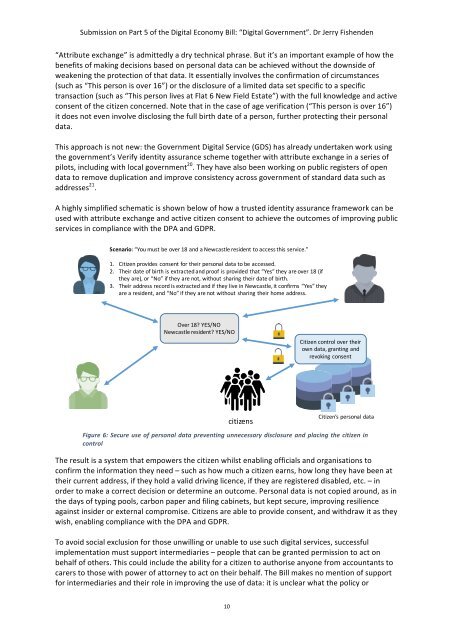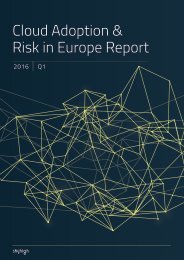Submission on Part 5 of the Digital Economy Bill “Digital Government”
part_5_digital_economy_bill
part_5_digital_economy_bill
Create successful ePaper yourself
Turn your PDF publications into a flip-book with our unique Google optimized e-Paper software.
<str<strong>on</strong>g>Submissi<strong>on</strong></str<strong>on</strong>g> <strong>on</strong> <strong>Part</strong> 5 <strong>of</strong> <strong>the</strong> <strong>Digital</strong> Ec<strong>on</strong>omy <strong>Bill</strong>: “<strong>Digital</strong> <strong>Government”</strong>. Dr Jerry Fishenden<br />
“Attribute exchange” is admittedly a dry technical phrase. But it’s an important example <strong>of</strong> how <strong>the</strong><br />
benefits <strong>of</strong> making decisi<strong>on</strong>s based <strong>on</strong> pers<strong>on</strong>al data can be achieved without <strong>the</strong> downside <strong>of</strong><br />
weakening <strong>the</strong> protecti<strong>on</strong> <strong>of</strong> that data. It essentially involves <strong>the</strong> c<strong>on</strong>firmati<strong>on</strong> <strong>of</strong> circumstances<br />
(such as “This pers<strong>on</strong> is over 16”) or <strong>the</strong> disclosure <strong>of</strong> a limited data set specific to a specific<br />
transacti<strong>on</strong> (such as “This pers<strong>on</strong> lives at Flat 6 New Field Estate”) with <strong>the</strong> full knowledge and active<br />
c<strong>on</strong>sent <strong>of</strong> <strong>the</strong> citizen c<strong>on</strong>cerned. Note that in <strong>the</strong> case <strong>of</strong> age verificati<strong>on</strong> (“This pers<strong>on</strong> is over 16”)<br />
it does not even involve disclosing <strong>the</strong> full birth date <strong>of</strong> a pers<strong>on</strong>, fur<strong>the</strong>r protecting <strong>the</strong>ir pers<strong>on</strong>al<br />
data.<br />
This approach is not new: <strong>the</strong> Government <strong>Digital</strong> Service (GDS) has already undertaken work using<br />
<strong>the</strong> government’s Verify identity assurance scheme toge<strong>the</strong>r with attribute exchange in a series <strong>of</strong><br />
pilots, including with local government 20 . They have also been working <strong>on</strong> public registers <strong>of</strong> open<br />
data to remove duplicati<strong>on</strong> and improve c<strong>on</strong>sistency across government <strong>of</strong> standard data such as<br />
addresses 21 .<br />
A highly simplified schematic is shown below <strong>of</strong> how a trusted identity assurance framework can be<br />
used with attribute exchange and active citizen c<strong>on</strong>sent to achieve <strong>the</strong> outcomes <strong>of</strong> improving public<br />
services in compliance with <strong>the</strong> DPA and GDPR.<br />
Scenario: “You must be over 18 and a Newcastle resident to access this service.”<br />
1. Citizen provides c<strong>on</strong>sent for <strong>the</strong>ir pers<strong>on</strong>al data to be accessed.<br />
2. Their date <strong>of</strong> birth is extracted and pro<strong>of</strong> is provided that “Yes” <strong>the</strong>y are over 18 (if<br />
<strong>the</strong>y are), or “No” if <strong>the</strong>y are not, without sharing <strong>the</strong>ir date <strong>of</strong> birth.<br />
3. Their address record is extracted and if <strong>the</strong>y live in Newcastle, it c<strong>on</strong>firms “Yes” <strong>the</strong>y<br />
are a resident, and “No” if <strong>the</strong>y are not without sharing <strong>the</strong>ir home address.<br />
Over 18? YES/NO<br />
Newcastle resident? YES/NO<br />
Citizen c<strong>on</strong>trol over <strong>the</strong>ir<br />
own data, granting and<br />
revoking c<strong>on</strong>sent<br />
citizens<br />
Citizen’s pers<strong>on</strong>al data<br />
Figure 6: Secure use <strong>of</strong> pers<strong>on</strong>al data preventing unnecessary disclosure and placing <strong>the</strong> citizen in<br />
c<strong>on</strong>trol<br />
The result is a system that empowers <strong>the</strong> citizen whilst enabling <strong>of</strong>ficials and organisati<strong>on</strong>s to<br />
c<strong>on</strong>firm <strong>the</strong> informati<strong>on</strong> <strong>the</strong>y need – such as how much a citizen earns, how l<strong>on</strong>g <strong>the</strong>y have been at<br />
<strong>the</strong>ir current address, if <strong>the</strong>y hold a valid driving licence, if <strong>the</strong>y are registered disabled, etc. – in<br />
order to make a correct decisi<strong>on</strong> or determine an outcome. Pers<strong>on</strong>al data is not copied around, as in<br />
<strong>the</strong> days <strong>of</strong> typing pools, carb<strong>on</strong> paper and filing cabinets, but kept secure, improving resilience<br />
against insider or external compromise. Citizens are able to provide c<strong>on</strong>sent, and withdraw it as <strong>the</strong>y<br />
wish, enabling compliance with <strong>the</strong> DPA and GDPR.<br />
To avoid social exclusi<strong>on</strong> for those unwilling or unable to use such digital services, successful<br />
implementati<strong>on</strong> must support intermediaries – people that can be granted permissi<strong>on</strong> to act <strong>on</strong><br />
behalf <strong>of</strong> o<strong>the</strong>rs. This could include <strong>the</strong> ability for a citizen to authorise any<strong>on</strong>e from accountants to<br />
carers to those with power <strong>of</strong> attorney to act <strong>on</strong> <strong>the</strong>ir behalf. The <strong>Bill</strong> makes no menti<strong>on</strong> <strong>of</strong> support<br />
for intermediaries and <strong>the</strong>ir role in improving <strong>the</strong> use <strong>of</strong> data: it is unclear what <strong>the</strong> policy or<br />
10





